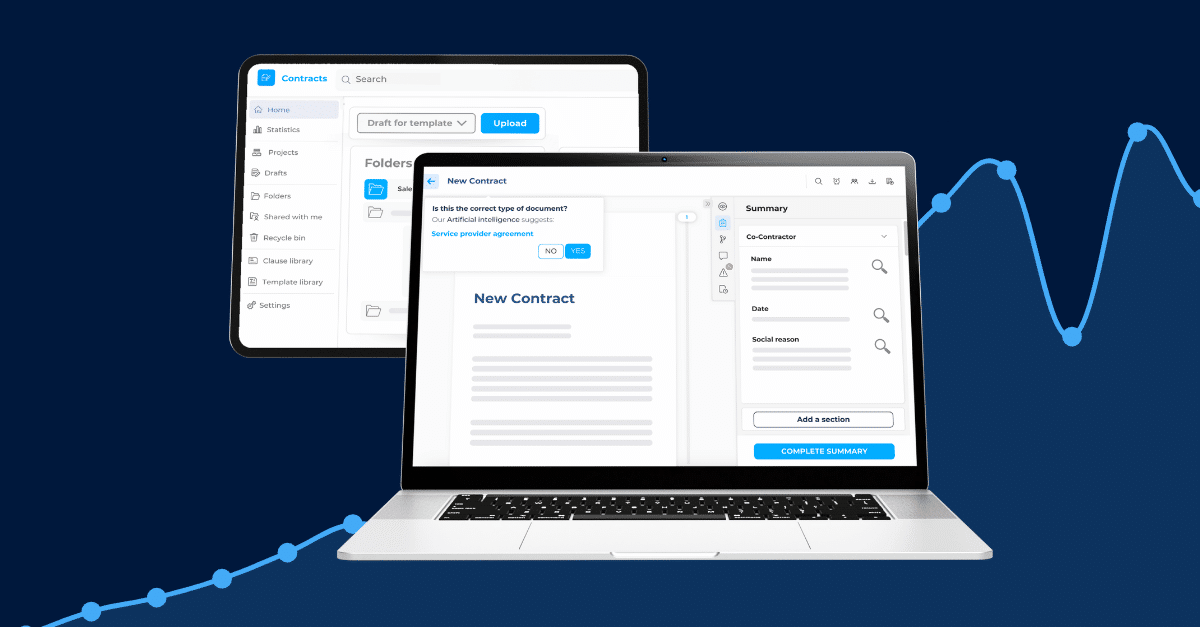AI is transforming legal contract management by automating contract review, risk analysis, and document generation. Leveraging technologies like natural language processing and machine learning, AI solutions accelerate workflows, improve accuracy, and reduce costs for legal teams. These tools enable better compliance, data-driven insights, and strategic focus, while also presenting challenges around complex contracts and data security. As AI advances, legal departments adopting these technologies gain a competitive edge through more efficient and proactive contract management.
Legal departments face mounting pressure to manage increasing volumes of contracts while maintaining accuracy and compliance. Artificial intelligence has emerged as a transformative force in legal contract management, offering solutions that streamline processes and enhance efficiency. This article explores how AI technologies are reshaping contract management and helping legal teams achieve better results with fewer resources.
Understanding AI in Legal Contract Management
AI in legal contract management refers to the application of advanced technologies that automate and enhance traditional contract processes. These technologies have evolved from basic document management systems to sophisticated platforms capable of analyzing, drafting, and managing complex agreements.
Modern AI contract systems employ natural language processing to understand contract text, machine learning to identify patterns across thousands of documents, and automated workflows to streamline approval processes. These capabilities enable legal teams to focus on strategic work rather than routine document review.
Top Benefits of AI-Powered Contract Management
Organizations implementing AI-powered contract management solutions experience numerous advantages that directly impact their bottom line and operational efficiency.
First, AI significantly accelerates contract review processes. What once took hours or days now requires minutes, allowing legal teams to process more agreements in less time. This acceleration doesn’t come at the expense of quality. In fact, AI often improves accuracy by consistently identifying issues human reviewers might miss.
Second, these technologies enhance risk management through automated identification of problematic clauses or missing terms. AI systems flag potential compliance issues before they become problems, protecting organizations from costly legal complications.
Third, AI delivers substantial cost savings. Companies utilizing AI for contract management report significant reductions in contract processing costs while simultaneously improving contract performance.
Additionally, these systems provide valuable data insights, transforming contracts from static documents into sources of business intelligence. This allows organizations to make more informed decisions about vendor relationships, contract renewals, and negotiation strategies.
Core AI Technologies Transforming Legal Contracts
Several key technologies form the foundation of modern AI contract management solutions.
Natural Language Processing (NLP) enables computers to understand and interpret human language within contracts. This technology allows systems to extract key information, identify clauses, and comprehend complex legal terminology.
Machine learning algorithms analyze patterns across contracts, learning to recognize standard provisions, variations, and potential risks. These systems improve over time, becoming more accurate as they process additional documents.
Automated document generation tools create standardized agreements based on pre-approved templates and clauses, ensuring consistency across an organization’s contract portfolio.
These technologies work together to create comprehensive solutions that address multiple aspects of contract management simultaneously.
Practical Applications for Businesses
AI contract management offers practical applications across the entire contract lifecycle:
Implementation Considerations
Successfully implementing AI contract management requires careful planning and consideration of several factors.
Organizations must assess their readiness for AI adoption, including current contract processes, data management practices, and team capabilities. A thorough evaluation helps identify the most appropriate starting point and implementation approach.
Data security remains paramount, particularly when handling sensitive legal documents. Organizations should evaluate potential solutions based on their security protocols, compliance certifications, and data protection measures.
Integration with existing systems presents another important consideration. The most effective AI contract solutions connect seamlessly with document management systems, e-signature platforms, and other business applications, creating a cohesive workflow.
Challenges and Limitations
While AI offers tremendous benefits for contract management, certain challenges exist. Current AI technologies excel at standardized agreements but sometimes struggle with highly complex or unusual contracts that fall outside normal patterns.
Additionally, AI systems require proper training and oversight. Organizations must balance automation with human expertise, particularly for high-value or strategic agreements where nuanced understanding remains essential.
Regulatory considerations also impact AI implementation. As regulations evolve regarding automated decision-making and data privacy, organizations must ensure their AI contract solutions maintain compliance with applicable laws.
The Future of AI in Legal Contract Management
The evolution of AI contract technologies continues at a rapid pace, with several emerging trends shaping the future landscape:
These advancements will continue to transform how legal departments operate, creating opportunities for greater efficiency and strategic focus.
Transforming Legal Operations Through Technology
AI contract management represents more than just a technological advancement: it offers a strategic opportunity for legal departments to elevate their role within organizations. By automating routine tasks, AI frees legal professionals to focus on higher-value activities that directly impact business outcomes.
Organizations that embrace these technologies position themselves for competitive advantage through faster deal closings, improved compliance, and more strategic contract management. As AI continues to evolve, the gap between early adopters and those relying on traditional methods will likely widen.
For legal departments considering AI implementation, the time to act is now. Begin by assessing current contract processes, identifying pain points, and exploring how AI solutions might address specific challenges. Even small-scale implementations can deliver meaningful results while building organizational comfort with these transformative technologies.
The future of legal contract management belongs to those who successfully blend human expertise with artificial intelligence, creating systems that deliver speed, accuracy, and strategic insight beyond what either could achieve alone.



